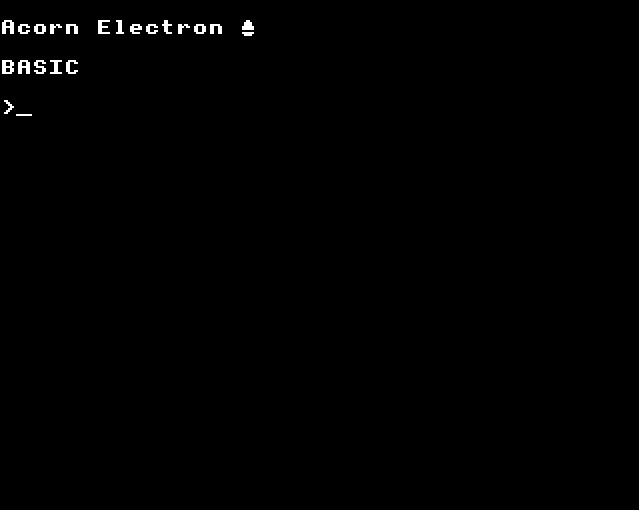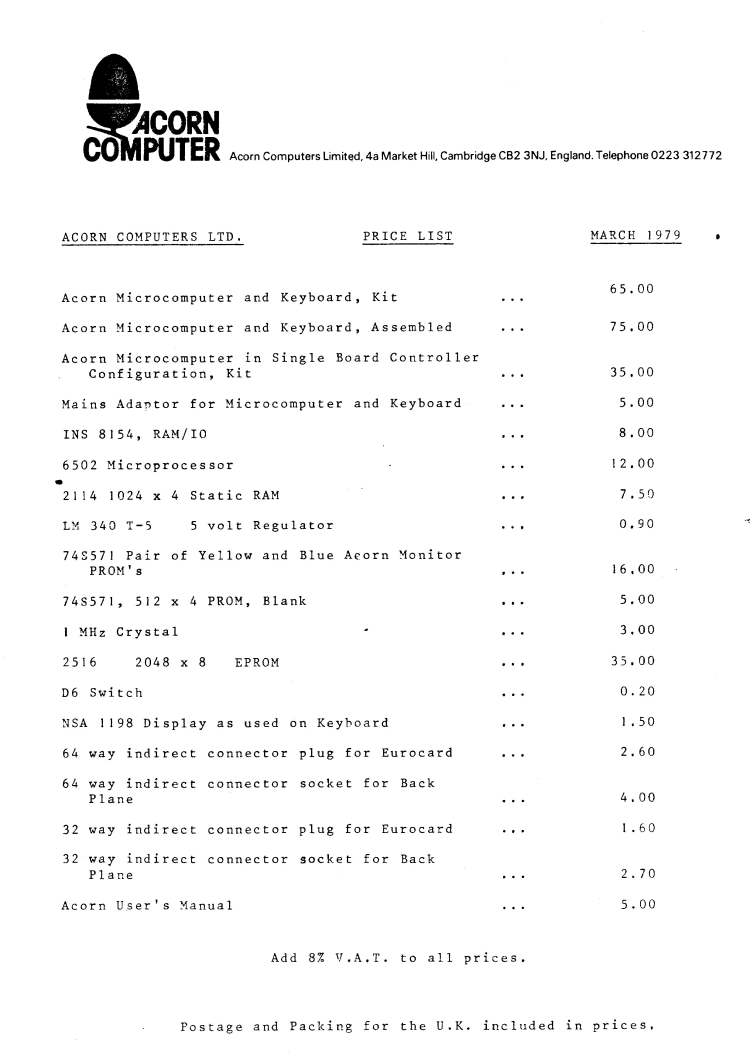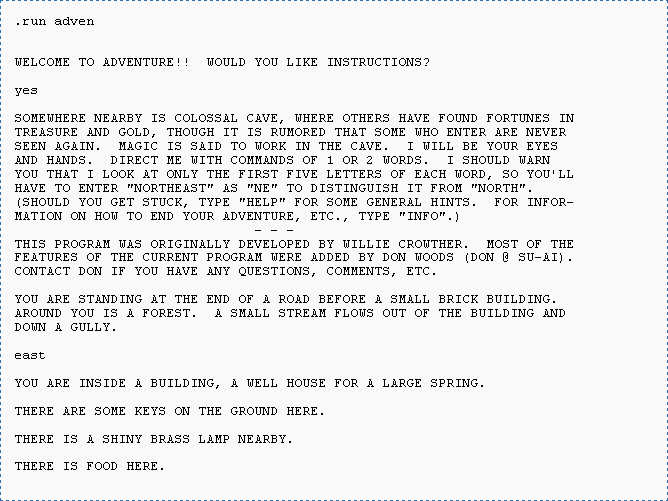|
Acornsoft
Acornsoft was the software arm of Acorn Computers, and a major publisher of software for the BBC Micro and Acorn Electron. As well as games, it also produced a large number of educational titles, extra computer languages and business and utility packages – these included word processor ''VIEW'' and the spreadsheet '' ViewSheet'' supplied on ROM and cartridge for the BBC Micro/ Acorn Electron and included as standard in the BBC Master and Acorn Business Computer. History Acornsoft was formed in late 1980 by Acorn Computers directors Hermann Hauser and Chris Curry, and David Johnson-Davies, author of the first game for a UK personal computer and of the official Acorn Atom manual "Atomic Theory and Practice". David Johnson-Davies was managing director and in early 1981 was joined by Tim Dobson, Programmer and Chris Jordan, Publications Editor. While some of their games were clones or remakes of popular arcade games (e.g. ''Hopper'' is a clone of Sega's '' Frogger'', ' ... [...More Info...] [...Related Items...] OR: [Wikipedia] [Google] [Baidu] |
Acorn Electron
The Acorn Electron (nicknamed the Elk inside Acorn and beyond) was a lower-cost alternative to the BBC Micro educational/home computer, also developed by Acorn Computers Ltd, to provide many of the features of that more expensive machine at a price more competitive with that of the ZX Spectrum. It had 32 kilobytes of Random Access Memory, RAM, and its Read-only memory, ROM included BBC BASIC II together with the Acorn MOS, operating system. Announced in 1982 for a possible release the same year, it was eventually introduced on 25 August 1983 priced at £199. The Electron was able to save and load programs onto compact audio cassette, audio cassette via a supplied cable that connected it to any standard tape recorder that had the correct sockets. It was capable of bitmapped graphics, and could use either a television set, a colour (RGB) monitor or a monochrome monitor as its display. Several expansions were made available to provide many of the capabilities omitted from the BBC M ... [...More Info...] [...Related Items...] OR: [Wikipedia] [Google] [Baidu] |
Elite (video Game)
''Elite'' is a space trading and combat simulator, space trading video game. It was written and developed by David Braben and Ian Bell (programmer), Ian Bell and originally published by Acornsoft for the BBC Micro and Acorn Electron computers in September 1984. ''Elite''s Open-ended (gameplay), open-ended game model, and revolutionary 3D graphics led to it being ported to virtually every contemporary home computer system and earned it a place as a classic and a genre maker in gaming history. The game's title derives from one of the player's goals of raising their combat rating to the exalted heights of "Elite". ''Elite'' was one of the first home computer games to use Wire-frame model, wire-frame 3D graphics with hidden-line removal. It added graphics and twitch gameplay aspects to the genre established by the 1974 game ''Star Trader''. Another novelty was the inclusion of ''The Dark Wheel'', a novella by Robert Holdstock which gave players insight into the moral and legal codes ... [...More Info...] [...Related Items...] OR: [Wikipedia] [Google] [Baidu] |
Snapper (game)
''Snapper'' is a clone of the Namco arcade game ''Pac-Man'' programmed by Jonathan Griffiths for the BBC Micro and released as one of the launch titles for Acornsoft in 1982. It was also one of Acornsoft's launch titles for the Acorn Electron in 1983. Snapper started the BBC Micro tradition of controlling arcade games using the Z, X, : and / keys for horizontal and vertical motion, since on most BBC models the arrow keys were not conveniently placed for gaming. Gameplay As in ''Pac-Man'', bonus items such as fruit sometimes appear in the centre of the screen. The highest-scoring bonus item is an acorn, a reference to the publishers. When Snapper is killed, t shrinks and turns into small lines pointing in all directions. The main difference in gameplay between ''Pac-Man'' and ''Snapper'' is the behaviour of the ghosts (or monsters). In ''Pac-Man'', each ghost has its own personality and follows set patterns for each level. The red ghost also travels at double speed after a certa ... [...More Info...] [...Related Items...] OR: [Wikipedia] [Google] [Baidu] |
ViewSheet
ViewSheet is a spreadsheet program produced in the 1980s by Acornsoft for use with the BBC Micro and Acorn Electron microcomputers. It was distributed as a pre-installed ROM with some computer models, such as the Master. ViewSheet was written by Mark Colton. Description ViewSheet supports spreadsheets of up to 255 by 255 cells in size. Each cell can contain a number, formula or text label. Cells are referred to as ''slots'' in the official Acornsoft documentation. The program is supplied with a keyboard card listing the various commands, which on the BBC Micro is placed under the clear plastic strip above the function keys. The spreadsheet is entered by typing *SHEET. All BBC Micro screen modes are supported, and the background and foreground colours can be changed by use of Ctrl-S,n,n,0,0,0 key sequences. The program supports user-defined windows that can display cells from various different parts of the spreadsheet within the same screen. This is useful in lieu of a WIMP Wi ... [...More Info...] [...Related Items...] OR: [Wikipedia] [Google] [Baidu] |
BBC Micro
The British Broadcasting Corporation Microcomputer System, or BBC Micro, is a series of microcomputers and associated peripherals designed and built by Acorn Computers in the 1980s for the BBC Computer Literacy Project. Designed with an emphasis on education, it was notable for its ruggedness, expandability, and the quality of its operating system. An accompanying 1982 television series, '' The Computer Programme'', featuring Chris Serle learning to use the machine, was broadcast on BBC2. After the Literacy Project's call for bids for a computer to accompany the TV programmes and literature, Acorn won the contract with the ''Proton'', a successor of its Atom computer prototyped at short notice. Renamed the BBC Micro, the system was adopted by most schools in the United Kingdom, changing Acorn's fortunes. It was also successful as a home computer in the UK, despite its high cost. Acorn later employed the machine to simulate and develop the ARM architecture. While nine mo ... [...More Info...] [...Related Items...] OR: [Wikipedia] [Google] [Baidu] |
Revs (video Game)
Revs is a 1985 Formula Three simulation written initially for the BBC Micro by Geoff Crammond and published by Acornsoft that is notable for its realistic simulation of the sport and as a precursor to its author's later work on '' Formula One Grand Prix'' and its sequels. Technical consultancy was provided by Formula Three driver David Hunt, whom Acornsoft's parent company Acorn Computers had sponsored during the British Formula Three Championship. Gameplay Unlike most contemporaneous racing games, ''Revs'' features selection of aerodynamic settings by the player and a full three-dimensional environment. The player is allowed to drive the wrong way around the track or even away from it completely. Unusual for the time, the track and terrain are not planar, but undulations in the ground are reproduced. The game was noted for its use of the BBC's hardware in achieving its display: such was the difficulty in squeezing the game into the BBC's limited memory, part of the game code actu ... [...More Info...] [...Related Items...] OR: [Wikipedia] [Google] [Baidu] |
Countdown To Doom
''Countdown to Doom'' is a text adventure game written by Peter Killworth for the BBC Micro and published by Acornsoft in 1982. It is set on the planet Doomawangara, which is coyly shortened to "Doom". An Acorn Electron version was released in 1984 but only as a ROM cartridge for the Plus 1 expansion. This was the only game released exclusively as a ROM cart for the Electron. There are two sequels, both published by Topologika: ''Return to Doom'' and ''Last Days of Doom''. Topologika rereleased ''Countdown to Doom'' in 1987, expanding the scope of the game by about 50%. It was published for the BBC Micro, Acorn Electron, ZX Spectrum, IBM PC compatibles, Amstrad CPC, Amstrad PCW, Atari ST, and RM Nimbus. A RISC OS RISC OS is a computer operating system originally designed by Acorn Computers Ltd in Cambridge, England. First released in 1987, it was designed to run on the ARM chipset, which Acorn had designed concurrently for use in its new line of Archi ... version was publ ... [...More Info...] [...Related Items...] OR: [Wikipedia] [Google] [Baidu] |
Acorn Computers
Acorn Computers Ltd. was a British computer company established in Cambridge, England, in 1978. The company produced a number of computers which were especially popular in the United Kingdom, UK, including the Acorn Electron and the Acorn Archimedes. Acorn's computer dominated the UK educational computer market during the 1980s. Though the company was acquired and largely dismantled in early 1999, with various activities being dispersed amongst new and established companies, its legacy includes the development of reduced instruction set computing (RISC) personal computers. One of its operating systems, , continues to be developed by RISC OS Open. Some activities established by Acorn lived on: technology developed by Arm (company), Arm, created by Acorn as a joint venture with Apple, Inc., Apple and VLSI Technology, VLSI in 1990, is dominant in the mobile phone and personal digital assistant (PDA) microprocessor market. Acorn is sometimes referred to as the "British Apple" and ... [...More Info...] [...Related Items...] OR: [Wikipedia] [Google] [Baidu] |
David Johnson-Davies
David Johnson-Davies is a British computer scientist and journalist. Early life and education David Johnson-Davies was born in London and has three children. He studied Experimental Psychology in Cambridge (where he currently resides), and became a researcher at the Medical Research Council Applied Psychology Unit (now the MRC Cognition and Brain Sciences Unit). Career In 1980, Johnson-Davies completed a PhD and then went on to join the computer company Acorn, developers of the BBC Microcomputer. Johnson-Davies was the founder and managing director of Acornsoft, publisher of video games such as Elite and the VIEW business software range by Mark Colton. In 1982, Johnson-Davies wrote ''Practical Programs for the BBC Computer and Acorn Atom''. In 1986, he left Acornsoft and establisheHuman Computer Interfaceshortly afterwards. The company developed Macintosh-based programs compatible with BBC BASIC and BBC Micro software, disks and networks, including for Hitachi and Royal ... [...More Info...] [...Related Items...] OR: [Wikipedia] [Google] [Baidu] |
Text Adventure
'' Interactive fiction, often abbreviated IF, is software simulating environments in which players use text commands to control characters and influence the environment. Works in this form can be understood as literary narratives, either in the form of interactive narratives or interactive narrations. These works can also be understood as a form of video game, either in the form of an adventure game or role-playing game. In common usage, the term refers to text adventures, a type of adventure game where the entire interface can be "text-only", however, graphical text adventures still fall under the text adventure category if the main way to interact with the game is by typing text. Some users of the term distinguish between interactive fiction, known as "Puzzle-free", that focuses on narrative, and "text adventures" that focus on puzzles. Due to their text-only nature, they sidestepped the problem of writing for widely divergent graphics architectures. This feature meant that in ... [...More Info...] [...Related Items...] OR: [Wikipedia] [Google] [Baidu] |
Peter Killworth
Professor Peter D. Killworth (27 March 1946 – 28 January 2008) was an English scientist known for his work on oceanography and on the study of social networks. A prolific writer, he published more than 160 scientific papers over the course of his career. He was also known for his work as a pioneering author of text games during the early 1980s. Peter Killworth died in 2008 from motor neurone disease. Oceanography The major part of Peter Killworth's career was spent as an[...More Info...] [...Related Items...] OR: [Wikipedia] [Google] [Baidu] |
Acorn Business Computer
The Acorn Business Computer (ABC) was a series of microcomputers announced at the end of 1983 by the United Kingdom, British company Acorn Computers. The series of eight computers was aimed at the business, research and further education markets. Demonstrated at the Personal Computer World Show in September 1984, having been under development for "about a year" and having been undergoing field trials from May 1984, the range "understandably attracted a great deal of attention" and was favourably received by some commentators. The official launch of the range was scheduled for January 1985. Acorn had stated in a February 1985 press release that the ABC machines would soon be available in 50 stores, but having been rescued by Olivetti, no dealers were stocking the range and only the Personal Assistant and 300 series models were expected to be on display by the end of March. However, the ABC range was cancelled before any of the models were shipped to customers. The ABC 210 was subsequ ... [...More Info...] [...Related Items...] OR: [Wikipedia] [Google] [Baidu] |




